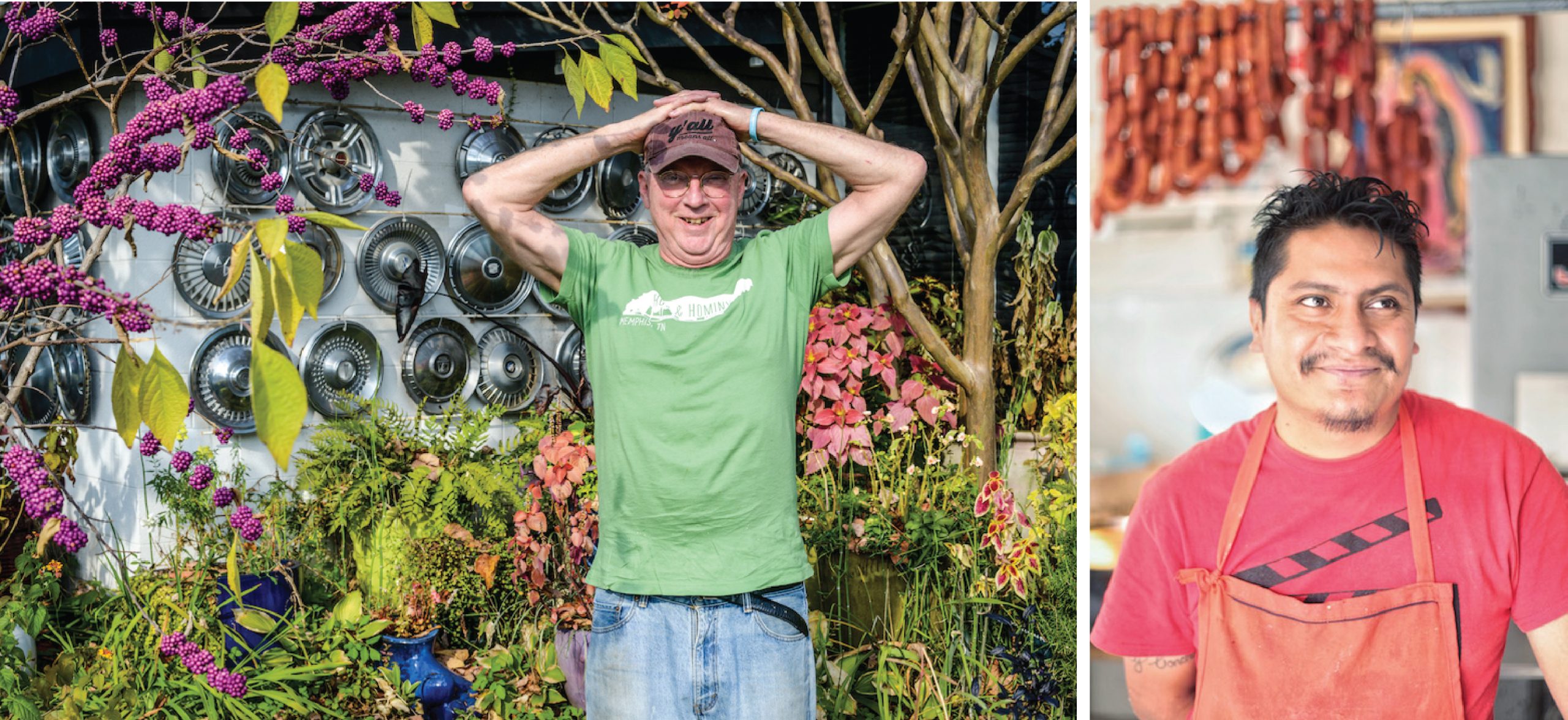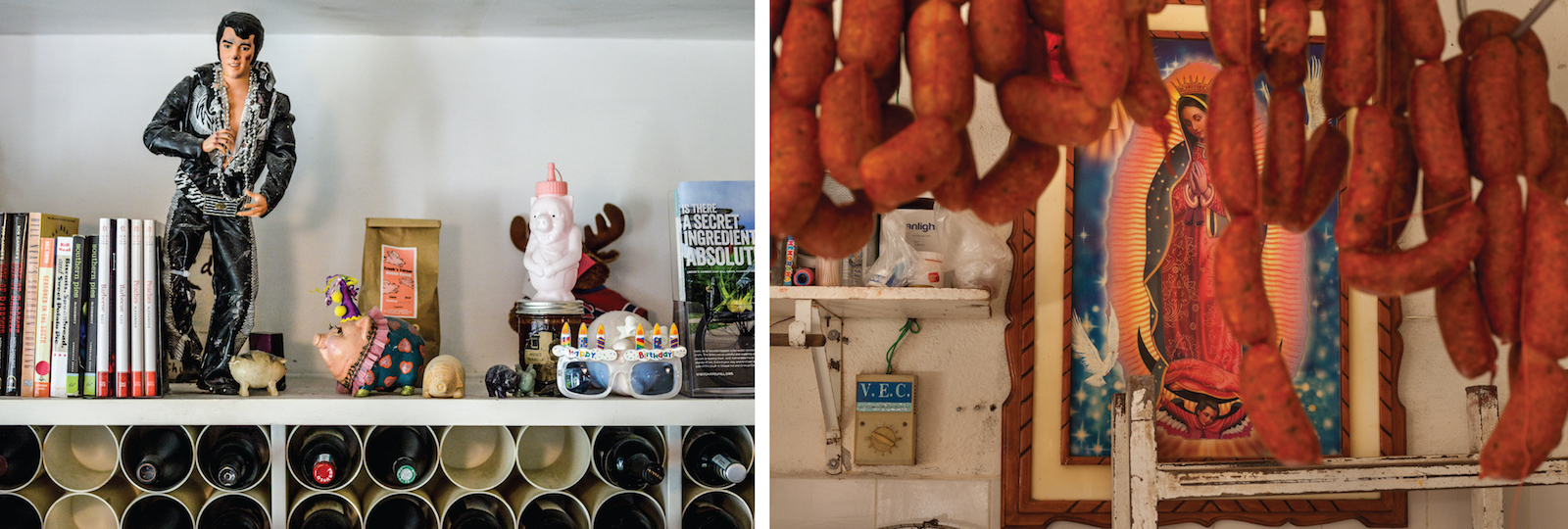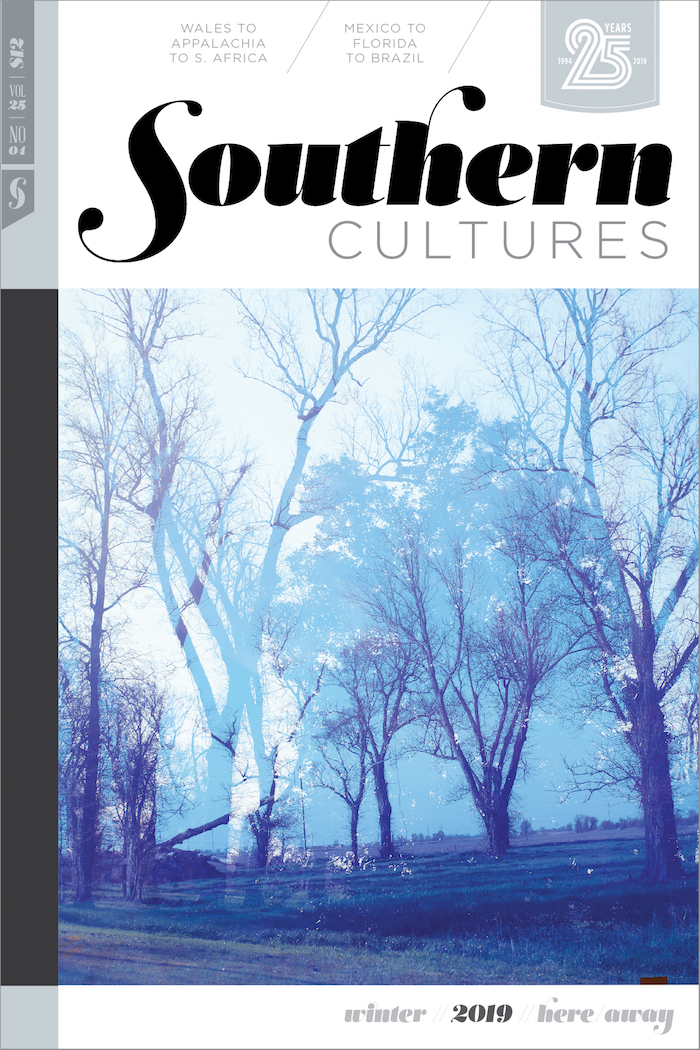“The sky had lightened. It was then that I realized that not only did I not have any idea where I was, but that neither did anyone else. Luis was not the least bit concerned.”
I’ve never wanted to get married, but if I ever did it should probably be to Luis. I can’t even tell you why exactly. It’s just something I know. Luis came to the United States at age seventeen, not because his family was poor, but because his father thought he needed to get off of his butt. It was sort of like when students from here go to Europe for the summer—an adventure abroad. His father told him to stay until he had earned enough money to buy a new pickup truck. This adventure abroad turned into seven years.
It was the mid-nineties. Guys floated around between restaurants a lot. At Crook’s Corner in Chapel Hill, where I was the chef, we shared Luis with another place down the street for a while, but he finally ended up working for us full time. By the time he and I got to be friends, most of my contemporaries had grown up, married, had children, and settled down, so I was looking for new people to cut up with. We were a match made in heaven.
In the years that we worked together we really didn’t do much. Go out to eat, drink beer, see bands, hang out. Those days, most of the Mexican guys living here didn’t have families with them, so we were each other’s company. And in no time, we really became each other’s families. There were lots of late nights in my living room. Sometimes, if we planned to go out to eat, say, at 6:00, Luis would turn up at 4:30 and ask if he could take a nap until suppertime. Other guys did this too. They worked two or three jobs sometimes, so any free moment was seen as potential naptime. I loved everything about these years. I am a textbook case of the Peter Pan Syndrome. I won’t grow up. With Luis and his friends, I didn’t have to.
Go out to eat, drink beer, see bands, hang out.
One day, Luis up and announced that he was going home. Such decisions tended to be sudden. At first, when these guys would go home for good, I would cry. Then I found out how cheap, easy, and fun visiting Mexico could be. It was no different than if your best buddy took a job on the West Coast. You could still get together, with planning. Luis had in fact bought a pickup truck and was going to drive it back home. I would ride shotgun. I love a road trip, and it had been years since I had taken a real one.
Luis came from the town of Celaya, in the state of Guanajuato. I had been there once before for a wedding. We figured it would take four or five days to make the drive. This was when he and I became best buddies ever. I saw this as a goofball adventure, but now I realize that for Luis it was probably quite emotional. He was returning to a very close-knit family that he hadn’t seen in years, and was letting go of a lifestyle that, though physically hard, was emotionally easy. The driving was going to be tiring, for sure. My friend was less of a clown than usual, but we still had fun. We’d drive all day, pick a motel at an interstate interchange, then we’d buy a bunch of beer and junk food and prop up in bed and watch the Athens Olympics on TV. We were in a pickup truck, so the whole thing had to be unloaded into our room every night. We were carrying a lot of stuff back for friends and family in Celaya. Besides all of Luis’s earthly possessions, there was a very big television, some microwaves, and a Barbie swing set.
Lots happened on this trip. In the United States, Comfort Inn was our favorite place to sleep and, except for once in Cajun Country, Waffle House was our favorite place to eat. We stopped one night in a beach town outside of Houston. There, we stumbled into a bar where it became clear that the patrons didn’t approve of white people and Mexicans socializing with each other, so we got out of there fast. At the time, we were amused by how stupid that bar crowd had been, but now, of course, that memory gives me the creeps.
The actual border crossing was involved. This was after 9/11. The clampdown at airports had been instantaneous and complete, but the land border seemed sort of haphazard. Apparently, the norm for transferring a vehicle title from the United States to Mexico was about $3,000 and three days. Luis had gotten the name of a man, a Sr. Tella, who would somehow be able to “expedite” all of this. We were to cross from Brownsville, Texas, to Matamoros in Tamaulipas. We settled into our hotel and called Sr. Tella. In about half an hour, there was a knock at the door. A stern man in a khaki uniform told us to give him $700 and the title to the truck. Luis did this without a thought. “I’ll be back in a few hours,” we were told. He in fact did return and we were instructed to have the truck loaded up and ready to go at six in the morning.
We were ready on time and Sr. Tella led us off into the dawn. We followed him through Brownsville and then across some water and through some kind of a culvert on the edge of town. A man in a tiny lighted booth waved us through without stopping us and voilà! We were in Mexico. We were then led into what seemed to be a junkyard with a heavy metal gate and high stucco walls. The gate slammed behind us. The walls were topped with barbed wire and they were just wide enough to allow a jumpy German shepherd to prowl round and round, barking. “Take everything out of the truck. Everything. Make sure you clean out the glove compartment and all of the pockets in the doors. Be sure to check under the seats.” We did as we were told. The stern Sr. Tella left with our truck and three hundred more dollars.

The sky had lightened. It was then that I realized that not only did I not have any idea where I was, but that neither did anyone else. Luis was not the least bit concerned. “Do you know these people?” No, he had gotten their phone number from a friend who had used them before. Suddenly, a very old man in a white cowboy hat appeared from what had looked to be an abandoned shed to show us that our junkyard had a latrine. Hallelujah. “Were we hungry?” He was having beans and would give us some. “No, thanks.” By then the sounds of the town could be heard over the wall. We actually were hungry, so the man let us out of a small door in the wall and out onto the streets of Matamoros. It was like Dorothy landing in Oz. Loud, bustling, colorful, and there was an ATM machine. Armed with pesos, we found food and returned to wait for the truck. By noon it was back, and the stern, uniformed Sr. Tella had become somewhat jolly. Luis was given a folder of documents and I was walked through the side door of an office to fill out a customs form and have my passport stamped. We were on our way. “Luis, aren’t you a little embarrassed to take part in this sort of thing?” I asked. “Not really,” he told me. “We saved $2,000 and two days. Besides, that’s how you get stuff done around here.”
The last night of our trip south found us in central Tamaulipas. It’s arid and mountainous, but not really a desert. We had passed through a remarkable forest of Joshua trees late in the day. Towns in rural Mexico don’t light up much at sundown. We could see this one from the highway, but just barely. It was beautiful from a distance, perched in the high sierra in the rose and purple light. Mariachis on the radio fittingly blared a processional as we entered the town of Tula. I could see that it had that wonderful sort of shabby beauty peculiar to the developing world. Mexico is First, Second, and Third Worlds all in one, but the middle one is the one I know best. It’s a hardscrabble, working-class Mexico held together by family and honor and tradition and threatened by narco-traffickers, globalization, and necessity. It’s a place where people spoil and protect their children with all of their might. And it’s a place quick to forgive one’s shortcomings and accepting of things that might surprise you.
Tula would be the last stop on our trip. Tomorrow we would be in Celaya. We found a place to stay easily—the Hotel Rossana in the center of town. As is typical in Latin America, the rooms surrounded a courtyard. Luis got hot water, I didn’t. I ran out for beer while he was in the shower. He got a little mad when I came back with Negro Modelos, his favorite. “We’re in Mexico now. You need to think about that.” It suddenly seemed extravagant. It was dawning on him what had happened to his earning power when we crossed the Rio Grande.

By late afternoon the next day, we were in Celaya. I could never decide if Luis had warned anyone that he was coming. I have known other people who had returned unannounced after many years and then immediately resumed their lives as if they’d only been gone for the weekend. We were at Luis’s mother’s house. Somebody had to clear out of their bedroom so that I could have one. Even though he had shown up with a total stranger, certainly unannounced, everyone was totally cordial.
This is a complicated family. Luis’s parents were separated but his father still owned the house, and he continued to come and go at will. He lived in another colonia with his girlfriend “La Guapa,” as she was derisively named by the women in the family. The lovely one. Luis’s mother’s response to his departure was to convert to Mormonism. Although the family is not particularly Catholic, this had freaked out Luis’s two sisters, Gaby and Lau. They had put up extra pictures of La Guadalupe all over the house. There are also two little brothers, Hugo and Carlos, who lived there then.
Luis’s father, nicknamed Chinche, or Bedbug, had a fairly successful meat wholesale business. Family members had small butcher shops all over town that sourced from there. Gaby was second-in-command. I didn’t know this at first, but she is also a lesbian and absolutely unapologetic about it. This surprised me at the time, but I didn’t know Mexico as well then.
Luis’s mother Conchita whipped up a big dinner party on our first night in town. The whole family was there, plus some neighbors. The first round of eating was over and the crowd was beginning to focus on the exotic gringo. If you know Latin America at all, you know that one of the first things that comes up will be your wife or girlfriend. I had neither. Luis had just spent five days, and, worse, five nights, with an unmarried, middle-aged man. “¿Es joto?” asked Chinche, not realizing that I spoke Spanish. “Is he a faggot?” The crowd went silent, Luis went red. “No preguntes si tú no quieres saber,” I offered. “Don’t ask if you don’t want to know.” More silence. I thought I’d have to find a hotel. Chinche was writing something. The family started talking again, quietly among themselves. Chinche gathered his sons and me together and presented me with a list. On it were the bars in town, grouped by sexual preference: straight, mixed, and gay. He wanted me to feel at home, but he also wanted us to cut a wide swath. He doesn’t drink anymore, so he wasn’t coming with us. “Have fun!”
We did. We were each other’s company. Here and there, we still are.
This essay appeared in the Here/Away Issue (vol. 25, no. 4: Winter 2019).
Chef and author BILL SMITH‘s first cookbook, Seasoned in the South: Recipes from Crook’s Corner and Home, is a New York Times Notable, Food & Wine Best Book, and also a top 10 southern essential by Southern Living. No longer the full-time executive chef at Crook’s Corner, he’s writing two books that meld his life’s work with foodways and his passion for human rights: Southern Ruckus: Recipes for Cooking, Carousing, Camaraderie and Carrying On and a memoir titled Kitchen Diplomacy, excerpted here.


